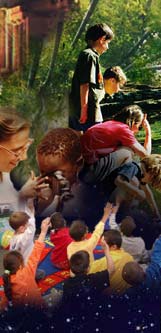 |
 |
VISION
Vision
and the Scientific Habit
of the Mind
An interdisciplinary educational project for
Alexandria and her sister cities
EXECUTIVE SUMMARY
This educational project offers local and
foreign elementary school teachers and students the opportunity
to customize an interdisciplinary museum-based program that effectively
integrates the fragmented school schedule, linking diverse disciplines
through a central theme and its concepts so as to help children
better understand and address complex, real-life problems. Students
enjoy these cognitively-challenging games, regardless of their race,
gender, creed, national origin, or handicapping condition.
Activities, research, readings, and projects related
to the theme, "Vision and the Scientific Habit of Mind,"
involve state-of-the-art educational toys and games, computer technology
and Internet capabilities in the classroom and the school. This
project culminates in the "Socrates Festival" showcasing
the students' work locally and on the Internet, and in a 12-foot
painted mural depicting the relationship between Alexandria and
the world to celebrate her 250th Anniversary in 1999. This international
project connects Alexandria and her sister cities through children's
discoveries and inventions across disciplines, increasing their
chances of gaining the kind of education, both in school and out
in the world, that best prepares them to become critical thinkers
in the global job market and interconnected society of the 21st
century.
PROJECT DESCRIPTION
"Vision and the Scientific Habit of Mind"
takes place in four stages: (1) The Socrates Institute 5-day, 30-hour
professional development workshop for educators, focusing on interdisciplinary
curriculum and Internet integration in October 1998, (2) communication
via e-mail and Internet and adaptation of the curriculum between
participating educators from November 1998-March 1999, to prepare
the elementary school teachers from Alexandria and our sister cities
to adapt, pilot, and implement in their own classrooms, an interdisciplinary
program based on the Smithsonian Institution
Museum of American History exhibit, Science in American Life,
(3) simultaneous, international implementation of the classroom
curriculum in April-May, 1999, and (4) The Socrates Festival June
4-5,1999, presenting the students' collaborative projects and interdisciplinary
mural, "Children's Visions of Alexandria: Past, Present &
Future" celebrating the 250th Anniversary of the city, and
showing how all fields of study and aspects of our lives here in
Alexandria both touch and have been touched by global events throughout
our history.
TIMELINE
1995-1996 Development
of "Vision" Project based on Smithsonian
Institution Museum of American History exhibit, Science in American
Life.
WINTER 1997 Project Approval and Support
by Alexandria Public Schools' Asst. Superintendent of Curriculum,
Pilot Teacher, and Principal of Patrick
Henry Elementary School.
FEBRUARY 1998 Pilot Teacher Workshop. The
Socrates Institute conducts a mini-workshop on educational philosophy
and interdisciplinary curriculum design and implementation.
MARCH 1998 Pilot Classroom Implementation
Project. Students learn to become keen observers, and visit the
Smithsonian exhibit to see how the work of visionaries and discoverers
has shaped the country and the world not just scientifically, but
in all aspects of our lives.
SPRING 1998 Recruit Teachers, High School
& Community Volunteers.
SUMMER 1998 Web Page Construction and International
Coordination. School technology director designs and hosts site
for posting student materials and conducting web chats.
OCTOBER 1997 Sister Cities Teacher Delegates
and Alexandria Participants Attend Socrates Workshop to Prepare
for Full Classroom Implementation. (Teachers from Caen, France and
Helsingborg, Sweden join Alexandria counterparts) Teachers take
"virtual field trips" on the Internet, visit local businesses
to select and identify relevant materials and contacts, tour the
Smithsonian exhibit and Hands-on Science
Center, meet with scientists who will work on-line, and make
other important contacts.
WINTER 1998 Teacher Communication, Materials
Preparation for Implementation. Teachers e-mail twice a week, access
a common web site to identify and post useful ideas, photos, Web
addresses, etc., preparing students as well as the actual materials,
toys, software, volunteers, and classrooms for the program. Volunteers
are familiarized with the project and their roles.
APRIL-MAY 1999 Full Classroom Implementation
of "Vision" Project. Teachers conduct the program, taking
students on virtual and/or real field trips, confronting them with
complex and fascinating problems related to how science penetrates
our lives, working with facilitators on designing appropriate investigative
strategies, and discovering tools necessary for addressing such
problems. Students e-mail each other questions, share ideas, discuss
collaborative "virtual" projects for The Socrates Festival,
design mural and begin to apply learned facts and skills towards
a greater understanding of the concepts studied. Students paint
a mural celebrating Alexandria's 250th Anniversary by deonstrating
their visions of the past, present, and future of the city.
June 4-5, 1999 The
Socrates Festival (Landmark Mall) Students design and display
projects for festival in Center Court, attended by the press, parents,
and community, to demonstrate their interdisciplinary understanding
of central themes from the study. Mayor Donley unveils the mural,
"Children's Visions of Alexandria" Past, Present &
Future."
SUMMER 1999 Program Evaluation. The Socrates
Institute conducts a qualitative evaluation of the entire program.
Such issues as: effectiveness, practicality, motivation, interest,
appropriateness, and usefulness across cultures, etc. are investigated
in depth.
FALL 1999 Final Report on Project, and
Dissemination of Program.
[
Socrates Main Menu]
[ Vision Menu
] [ Festival Menu
]

CyberEthics Project
|
 |

